Coronavirus: Greg Hunt hopes National Cabinet here to say, RBA boss says JobKeeper may need to be extended
Health Minister Greg Hunt says the tragic death a 30-year-old is a reminder that COVID-19 can “strike anybody”, as the RBA says the $70 billion JobKeeper program may need to be extended.
Coronavirus
Don't miss out on the headlines from Coronavirus. Followed categories will be added to My News.
Health Minister Greg Hunt says the tragic death in Queensland of a 30-year-old man is a reminder that the coronavirus can “strike anybody”.
“It does remind us that this condition will be with us going forward. We have to expect spikes of outbreaks that means out behaviours going for are more important than ever,” he told reporters in Canberra.
“It’s particularly important for young Australians in their 20s and 30s, and in their teens, to realise that they are not immune, and we are not immune, and that if they keep that distance they can protect themselves and their families.”
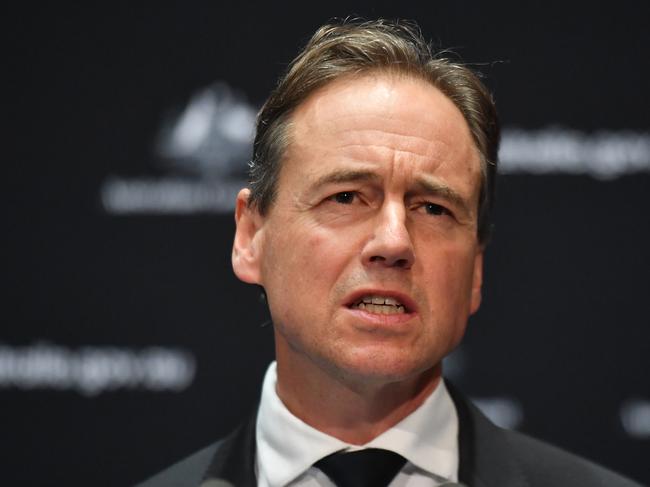
The National Cabinet, he said, has proven to be “extremely valuable” and has “facilitated Australia’s response” to coronavirus.
“I hope that there is support for it from the states and the premiers and the chief ministers going forward,” he said.
Earlier, Reserve Bank Governor Philip Lowe said the $70 billion JobKeeper program might need to be extended if Australia can’t boost business confidence and get new construction projects coming through the pipeline.
Mr Lowe has told the Senate COVID-19 committee it was “very important” fiscal stimulus was not withdrawn “too early,” suggesting the wage subsidy may need to continue beyond September if Australia’s economy was still struggling.
“If we have not come out of the current trough in economic activity there will be and there should be a debate about how the JobKeeper program transitions into something else,” he said.
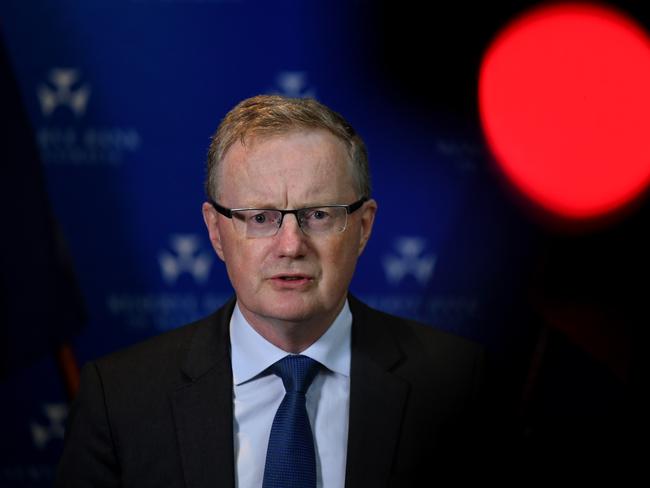
Mr Lowe also said it was “entirely possible that the economic downturn would not be as severe as originally thought,” but it would depend on how quickly confidence was restored.
“Even as the recovery gets underway as it will there will still be a shadow cast over our economy by the pandemic,” he said.
He said although the job losses recorded in April were “shocking” they “weren’t quite as bad we thought they were going to be”.
Mr Lowe told the Senate COVID-19 Committee hearing that there had been “some pick up” in employment since April in the industries hardest hit by the shutdown.
However he said the “complex picture” of the labour market during the pandemic meant there was now a decline in unemployment in sectors such as construction and professional services that had “kept the jobs going” in the first couple of months of the shutdown.
Dr Lowe, Australian Prudential Regulation Authority chair Wayne Byres and Australian Securities and Investments Commission chair James Shipton are appearing via videoconference before the COVID-19 committee hearing.
“Labor is looking forward to the opportunity to hear from the RBA governor about his views on the economic response to COVID-19 and the best path forward for recovery,” Labor senator and inquiry chair Katy Gallagher said.
“Australia entered this crisis from a position of weakness, not strength. “With monetary policy now all-but exhausted, Governor Lowe’s views about where Australia goes from here will be important evidence for this committee and vital to Australians who are relying on this government to get the recovery right.”
Dr Lowe has been talking up the need to restore business and consumer confidence, while noting the ultimate key to recovery hinges on the development of a medical treatment for the virus.
He told a forum last week the faster that restrictions can be lifted safely, the sooner and stronger the economic bounce-back will be and the less “economic scarring” will take place.
Finance Minister Mathias Cormann backed the call for the economy to be restored back to normal as soon as possible.
He said the government had “planned for the worst” two months ago, but Australia was now “close to eliminating” the spread of virus cases.
This had led to a “change in parameters” when it came to the federal budget and spending.
“We, of course, are working now on the transition out of the period of temporary support measures in the economy,” he told the ABC.
“In that context, of course, we will be announcing a whole series of measures, including, and in particular, through the budget on October 6 to maximise the strength of our economic recovery.”
US PASSES 100K VIRUS DEATHS
The United States passed the grim mark of 100,000 coronavirus deaths as Las Vegas prepared to reopen its iconic casinos and Florida readied to welcome visitors back to its famous theme parks.
And despite continued warnings from health authorities to continue to show caution in public, crowds of unmasked Americans swarmed to beaches and public health officials predict a resurgence by fall.
The first death in the US occurred just 88 days ago.
The US death tally reported by NBC is far higher than any other nation, although the rate of death is significantly lower than in many European nations.
But health experts say the true toll from the pandemic is already likely to be much higher, with many cases were probably overlooked or misreported as the flu or pneumonia.
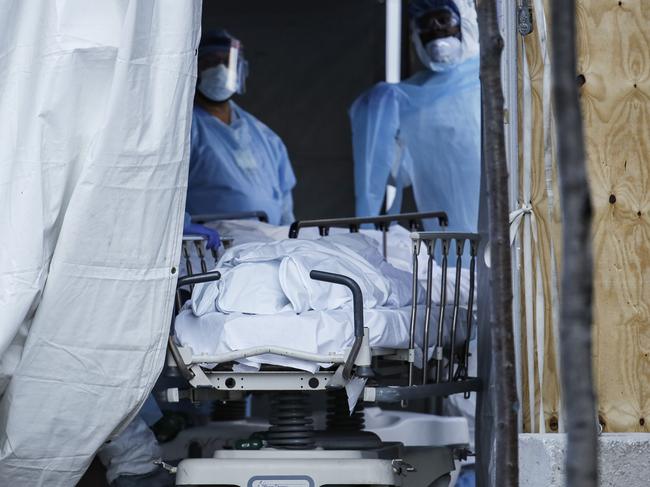
“In an ideal world, every COVID-19 death would have ‘COVID-19’ written on the death certificate as the underlying cause,” said Andrew Noymer, an associate professor of public health at the University of California, Irvine. “But that is not happening.”
The virus moved across the country in a matter of weeks, and no state was spared.
At least 37,000 deaths have been linked to nursing homes and other long-term care facilities, and hundreds of virus deaths continue to be announced every day in the United States. But the pace has slowed significantly since April, when it was common for more than 2000 deaths to be announced on weekdays.
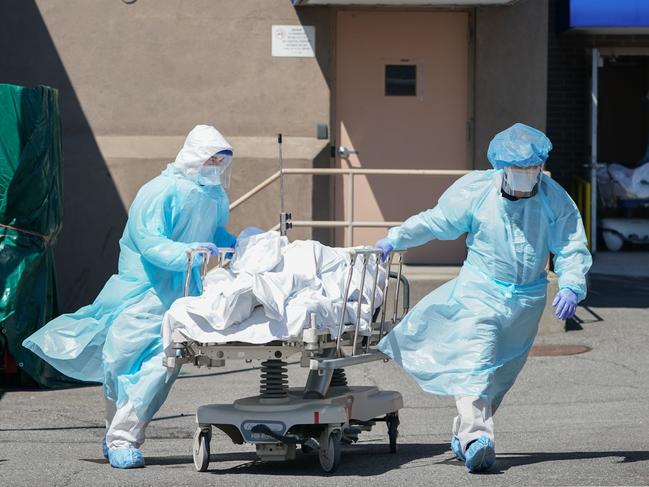
Only once in the last 10 days have there been more than 1500 deaths announced in a single day. The 510 announced on Monday were the fewest in a day since late March.
The challenge ahead for America was highlighted by a new AP-NORC Centre for Public Affairs poll that showed that only half of Americans said they would be willing to get vaccinated if scientists are successful in developing a vaccine.
Dr Anthony Fauci, the nation’s top infectious disease expert, issued a stern warning after viewing video showing Memorial Day crowds gathered at a pool party in Missouri.
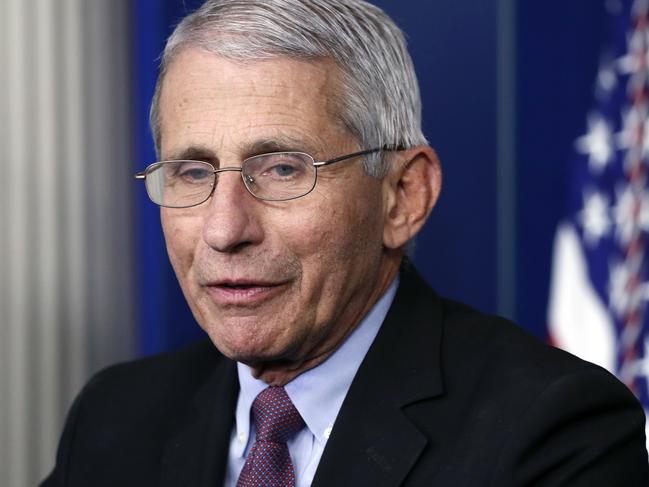
“We have situation in which you see that type of crowding with no mask and people interacting. That’s not prudent and that’s inviting a situation that could get out of control,” he said.
“Don’t start leapfrogging some of the recommendations in the guidelines because that’s really tempting fate and asking for trouble.”
BORIS TELLS BRITS: ‘MOVE ON’
Meanwhile, British Prime Minister Boris Johnson this afternoon said the nation needed to “move on” from the Dominic Cummings row and focus on defeating coronavirus.
The British PM faced a heated 90 minute grilling from politicians on the virus, lockdown rules, and whether he was right to keep his top aide in post despite being accused of breaking the rules, The Sun reports.
He has stood by Mr Cummings despite anger from sections of the public, and condemnation from some MPs.
But the aide insists he acted legally and reasonably by driving more than 400km up to Durham while he was sick with coronavirus, to make sure that he was near family in case they needed to look after his young son.
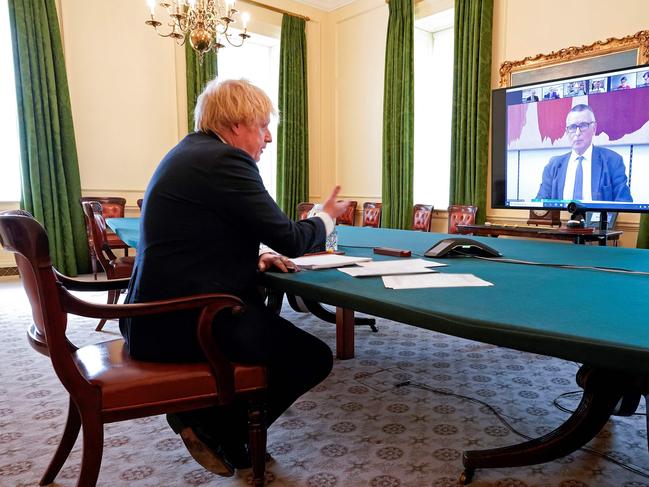
Mr Johnson told British MPs: “What we need to do now, as politicians, as leaders, is to set aside this row because I’m afraid a lot of allegations turned out to be totally false, and to move on.
“I have said what I have to say about that matter.”
And he ruled out an inquiry into the matter, saying it was not a good use of time when the country was focused on coronavirus.
Labour’s Yvette Cooper launched into a fuming tirade at Mr Johnson – accusing him of putting his own political interests above the country and ducking vital questions.
She stormed: “You are trying not to incriminate Dominic Cummings.
“You are putting political concerns ahead of the clear public health message to parents who have coronavirus, putting political concerns about the national interest.
“40,000 people are dead. We need you to get this right now.
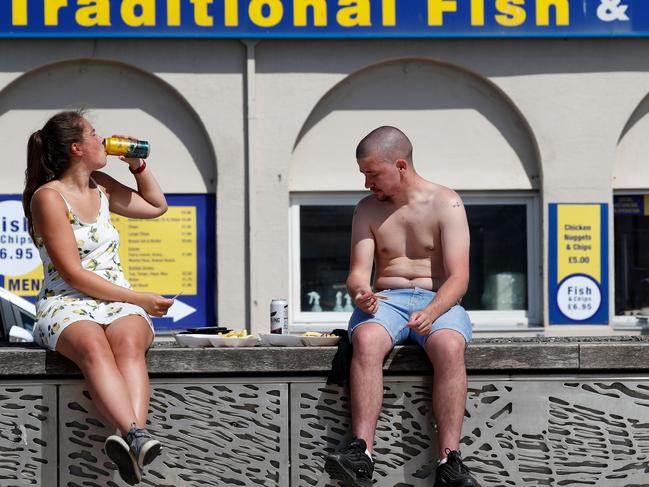
“You have a choice between protecting Dominic Cummings and putting the national interest first, what will it be, PM?”
But Mr Johnson hit back, demanding she “lay aside party political pointscoring and put the national interest first”.
And he jibed: “Frankly, when they hear nothing but politicians squabbling and bickering, it’s no wonder they feel confused.”
But Tory MPs lined up to tell Mr Johnson that the row was now a “distraction” from the business of government.
Simon Hart told the PM: “People are very annoyed, Prime Minister. Is that on your radar?”
Mr Johnson said he did “understand people’s feelings” over the whole row, but he stressed what they wanted now was “for us to focus on them and their needs rather than a political ding dong about what an adviser may or may not have done”.
The PM also confirmed this afternoon that England’s test and trace system will come into play from tomorrow.
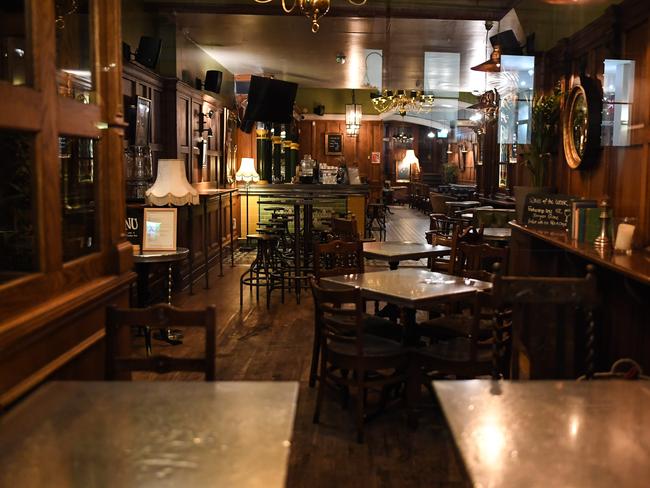
WORLD GETS SET TO REOPEN
Meanwhile, in better news for Brits, Mr Johnson said pubs might be able to reopen next month, ahead of the scheduled July restart.
Germany once again demonstrated Europe’s world-leading determination to get tourism restarted with Berlin aiming to lift travel warnings for 31 European countries from mid-June.
Moscow Mayor Sergei Sobyanin announced an easing of the Russian capital’s lockdown starting June 1 after the Kremlin said the coronavirus pandemic had passed its peak in the country.
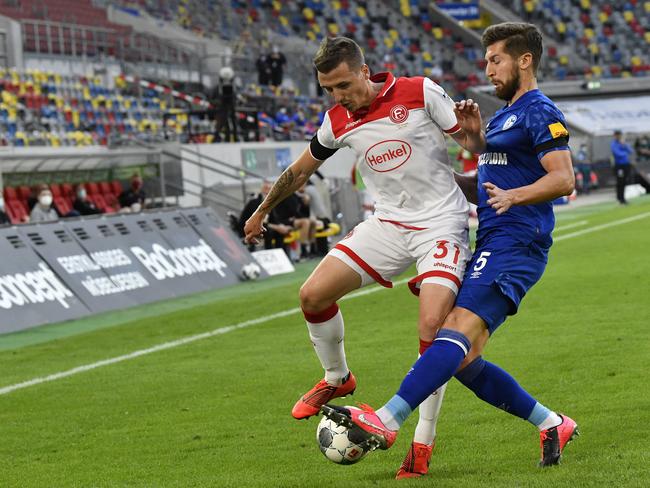
“Today we can already talk about the next steps out of the crisis situation,” Sobyanin told President Vladimir Putin during a televised video conference.
“I propose from June 1 to reopen not only food retail but all non-food retail.”
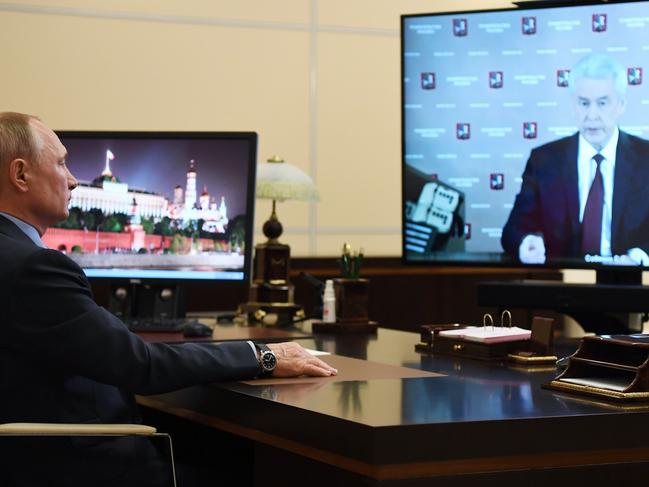
And Sao Paulo state, the epicentre of the coronavirus outbreak in Brazil, will reopen some of its closed businesses starting June 1 despite a fast growing number of confirmed COVID-19 cases.
Governor Joao Doria said that stay-at-home recommendations will remain in effect until June 15 for the state that’s home to 46 million people, but some economic activity will resume.
The businesses allowed to reopen initially under a five-step plan are stores, shopping malls, offices, car dealerships and real estate brokerages. Social distancing and masks will still be necessary.
VEGAS IS COMING BACK, BABY
Las Vegas is gearing up to resume its role as the world’s most iconic party destination after casinos were given the green light to reopen next week – with strict coronavirus safety measures that could put a damper on the fun.
And the iconic family destinations SeaWorld and Walt Disney World will reopen in Orlando, Florida, in June and July after months of inactivity because of the coronavirus pandemic.
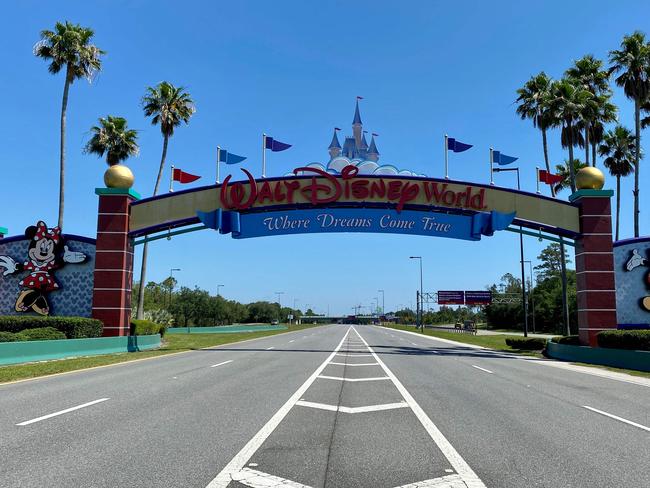
The news of the reboot of fun in the US came on the grim day that the nation’s COVID-19 death toll passed 100,000.
Nevada Governor Steve Sisolak said casinos on the Vegas strip and around the state will be allowed to reopen on June 4, more than 11 weeks after they were shuttered due to the pandemic.
But Sin City will look a lot different than it has in the past thanks to new rules aimed at stemming the spread of coronavirus.
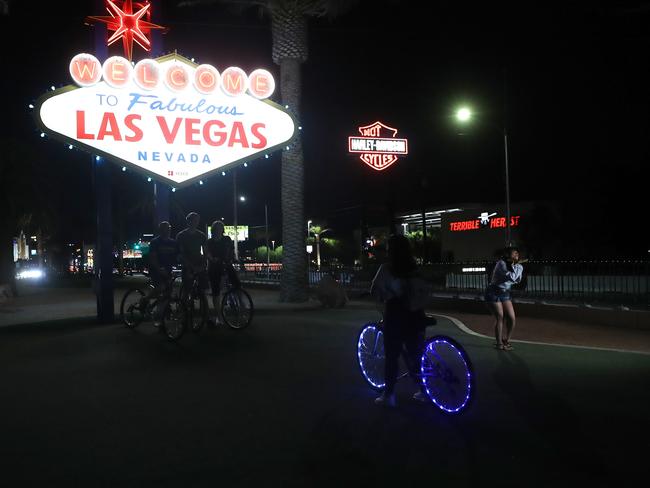
Casinos that draw millions of tourists to Vegas each year have already begun installing safety measures including thermal imaging at entrances, handwashing stations in the place of slot machines, and plastic partitions between players at card tables.
“We welcome the visitors from across the country to come here, to have a good time, no different than they did previously, but we’re gonna be cautious,” Governor Sisolak said.
“We’ve taken every precaution possible. I don’t think you’re going to find a safer place to come than Las Vegas by June 4, with the protocols that we’ve put in place, than the testing that we’ve put in place, with the contact tracing that will be in place by that time.”
SOUTH KOREA REVEALS SHOCK SURGE IN VIRUS CASES
As Mediterranean beaches and Las Vegas casinos laid out plans to welcome tourists again, South Korea announced a spike in new infections Wednesday and considered reimposing social distancing restrictions, revealing the setbacks ahead for others on the road to reopening. The European Union was unveiling a huge stimulus package for the bloc’s ailing economies, as European nations scrambled to emulate South Korea’s widely praised strategy of tracing, testing and treating coronavirus victims, which tamed its outbreak and made it a model for the world.
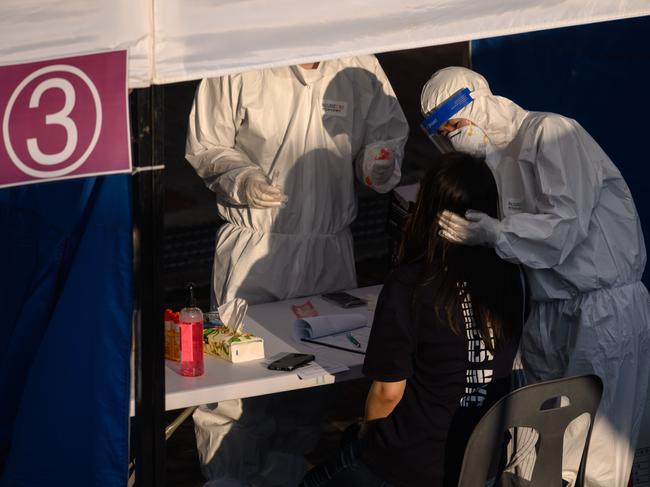
The EU’s economics commissioner, Paulo Gentiloni, called the 750 billion-euro ($825 billion) recovery fund “a European turning point to face an unprecedented crisis.” Across the Atlantic, the pandemic was claiming new victims as the confirmed U.S. death toll approached 100,000 – the highest by far in the world – and nations from Mexico to Chile to Brazil struggled with surging cases and overwhelmed hospitals.
In South Korea, 40 newly confirmed cases – the biggest daily jump in nearly 50 days – raised alarms as millions of children returned to school Wednesday. All but four of the new cases were in the densely populated Seoul region, where officials are scrambling to stop transmissions linked to nightclubs, karaoke rooms and a massive e-commerce warehouse. All were reopened last month when social distancing measures were relaxed.
The country’s top infectious disease expert said South Korea may need to reimpose social distancing restrictions because it’s becoming increasingly difficult for health workers to track the spread of COVID-19 amid warmer weather and eased attitudes on distancing.
“We will do our best to trace contacts and implement preventive measures, but there’s a limit to such efforts,” said Jeong Eun-kyeong, director of South Korea’s Centres for Disease Control and Prevention.
“Young people have a very broad range of activity, so at the point of diagnosis, there’s already a lot of exposure … the number of people or locations we have to trace are increasing geometrically,” he added.
Seoul and nearby cities in recent weeks have re-closed thousands of bars, karaoke rooms and other entertainment venues to slow the spread of the virus. Britain, which has recorded more deaths than any other European country – over 37,000 – was announcing the details of its own “test and trace” plans, which will send out 25,000 workers to find the contacts of those who test positive. Germany said it would extend pandemic-related restrictions on personal contacts until June 29 as it cautiously lifts lockdown measures.
Poland is lifting limits on the number of customers in shops, restaurants and hairdressers on Saturday, allowing any number to attend church services and authorising open-air gatherings of up to 150 people.
As many countries in Asia and Europe make progress in containing the pandemic, reversing its devastating economic fallout becomes a top priority. Even as the 27-nation EU unveiled its recovery plan, the bloc remained deeply divided over what strings should be attached to the funds, with frugal members such as Austria, Denmark, the Netherlands and Sweden pushing for loans rather than grants to form the backbone of the package.
Cyprus announced Wednesday that tourists would be welcomed back on June 9. To make them feel safe, Cyprus said would cover all costs – lodging, food, drink and medication – for anyone testing positive for the coronavirus and their family while on vacation in the east Mediterranean island nation. But tourism was far from the concerns of some other nations. India saw another record single-day jump, reporting 6,387 new cases on Wednesday as the government prepared new guidelines for the next phase of a 2-month-old national lockdown that ends Sunday.
Mexico’s health department reported 501 deaths from the coronavirus – a new one- day high.
A US travel ban took effect for foreigners coming from Brazil, where President Jair Bolsonaro has raged against state and local leaders who are enforcing stay- at-home measures. Brazil has about 375,000 coronavirus infections – second only to the 1.6 million cases in the U.S. – and has counted over 23,000 deaths, but many fear its true toll is much higher.
Worldwide, the virus has infected nearly 5.6 million people and killed over 350,000, including about 170,000 in Europe, according to a tally by Johns Hopkins University of government reports, which experts say does not show the entire scope of the pandemic.
Flags were flying at half-mast Wednesday on more than 14,000 public buildings as Spain held the first of 10 days of national mourning for coronavirus victims.
MORE NEWS
Prisoners offered new drug after riots over visit restrictions
When private school students will return to classrooms
Aussie tourist stabbed in alleged nightclub rampage
In the US, President Donald Trump several months ago likened the coronavirus to the flu and dismissed worries that it could lead to so many deaths. The administration’s leading scientists have since warned that as many as 240,000 Americans could die in the country’s outbreak.
The White House said the president was committed to holding a Fourth of July celebration in the nation’s capital even as local officials warned that the region – one of the hardest hit by the coronavirus – will not be ready to hold a major event so soon.
U.S. officials are pushing hard to reopen even as more than a dozen states are still seeing increasing new cases.
Around the globe, an eagerness to get back to normal is being offset by nervousness about what might come next.
Greece, which has seen only 173 coronavirus deaths, will let international tourists return to its sun-dappled islands beginning June 15. While many island residents depend on tourism for their livelihoods, they have also taken comfort in their isolation during the pandemic and worry about opening up to outsiders. “So far things have gone well,” said Katerina Vikeli on the island of Milos. “Now with the people who will come, what will happen?” In New Zealand, which is still banning foreign arrivals, the Ministry of Health said there were now no COVID-19 patients in the country’s hospitals.
Originally published as Coronavirus: Greg Hunt hopes National Cabinet here to say, RBA boss says JobKeeper may need to be extended


